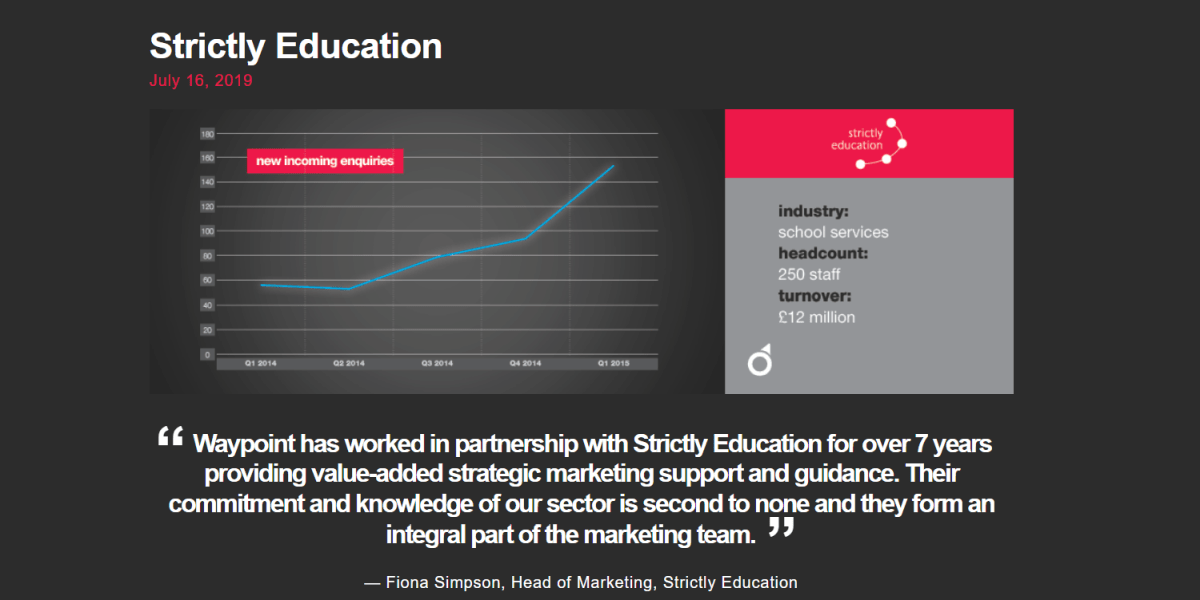“Customer trust as a key business metric”
According to ICF Next, consumer trust is one of the 8 marketing trend predictions for 2022 and will become a key focus for businesses when planning their marketing strategy for the year.
Buyers these days have higher expectations and increasingly rely on trust to determine their investments in brands and products. In other words, buyers are likely to base their buying decision on recommendations from a friend or online reviews to see what other consumers are saying about a product or service.
That brings us to Case Studies.
Although case studies have been around for a long time, there is no better way of promoting your business, building credibility, and demonstrating your success to instil trust and build lasting relationships with your customers.
What are case studies?
Case studies are an efficient way to demonstrate your expertise and persuade customers. It’s a super useful tool to “brag” about a successful implementation, the value customers are getting from your product or a problem you have solved with your expertise. Using a story-based structure, case studies detail your process and your customer’s positive experiences.
Why should you use case studies in your marketing?
A good case study will discuss a challenge or requirement that was resolved by your business, and the positive outcome that was achieved as a result. Great case studies are filled with images, research and customer quotes that amplify the story and make it more compelling.
– It tells a story
Case studies tells a story of your brand with a ‘happy ending’. The best way to tell this story is from your customers’ point of view. Interview your customers or provide them with a set of questions they can answer, throw in some facts and figures and you end up with a story that’s relatable and convincing.
– It builds your reputation
Case studies help your company build credibility and credibility is what convinces prospective customers to give your product or service a try. Case studies published on your website or shared on social media act essentially as a customer review where positive comments and experiences build your company’s credibility.
– It demonstrates success
The whole point of a case study is to illustrate how your product or service looks in action, and how they get results. Case studies can show potential customers with a similar challenge how they can get the same results.
– It generates more leads
When done correctly, case studies are a simple marketing strategy that generate effective sales leads. To get the most out of your case studies, give potential customers a reason to read further (positive tone), include tangible results (statistics or how much money was saved), use visual like graphs and images and include customer quotes and a call to action to track conversions.
9 simple ways to use case studies
Website: Publish case studies on a dedicated page on your website and a add a shortcut of the latest case studies on your home page
Sales material: Use case studies as part of sales materials in pdf format or email campaigns
Product pages: Use case studies on product or service pages with a CTA to download and collect user information
Blogs: Write blogs about your case studies and share them on social media
Video content: Create videos from case studies or snippets/animation with quotes
Landing pages: Use case studies on landing pages to help convince potential customers to reach out to you or download your offer
Social media: Post about case studies on social media and remember to tag the customer in the post
Ebooks: Use quotes from case studies in ebooks and training materials.
Example of Case Studies by Waypoint:


If you want to find out about how we can help you create case studies as part of your overall content marketing strategy, get in touch by calling 01962 862760 or emailing info@waypointdigitalmarketing.com.







































